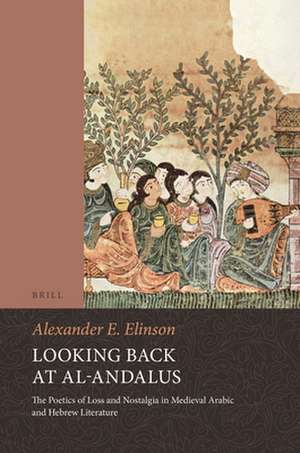Looking Back at al-Andalus: The Poetics of Loss and Nostalgia in Medieval Arabic and Hebrew Literature
Autor Alexander Elinsonen Limba Engleză Paperback – 7 ian 2015
Preț: 355.55 lei
Nou
Puncte Express: 533
Preț estimativ în valută:
68.04€ • 72.75$ • 56.73£
68.04€ • 72.75$ • 56.73£
Carte indisponibilă temporar
Doresc să fiu notificat când acest titlu va fi disponibil:
Se trimite...
Preluare comenzi: 021 569.72.76
Specificații
ISBN-13: 9789004290976
ISBN-10: 9004290974
Pagini: 186
Dimensiuni: 155 x 235 x 10 mm
Greutate: 0.32 kg
Editura: Brill
Colecția Brill
ISBN-10: 9004290974
Pagini: 186
Dimensiuni: 155 x 235 x 10 mm
Greutate: 0.32 kg
Editura: Brill
Colecția Brill
Notă biografică
Alexander E. Elinson, Ph.D. (2004) in Middle East and Asian Languages and Cultures, Columbia University, is Associate Professor of Arabic at Hunter College of the City University of New York. His research interests include medieval Arabic and Hebrew literature from Muslim Spain and North Africa, as well as contemporary Moroccan literature.
Recenzii
« Au croisement de l’étude littéraire et de l’histoire des mentalités, Looking back at al-Andalus propose une réflexion intéressante sur les notions « d’ andalusité » et « d’arabité », sur les rapports entre l’Andalus, le Masriq et le Magrib, sur les interférences littéraires entre rhétorique arabe et hébraïque, etc. Il est d’une lecture agréable et féconde, sans préjuger des points de désaccord qu’il ne manquera pas de susciter chez certains lecteurs »
Katia Zakharia in BCAI 26 (2010).
Katia Zakharia in BCAI 26 (2010).
